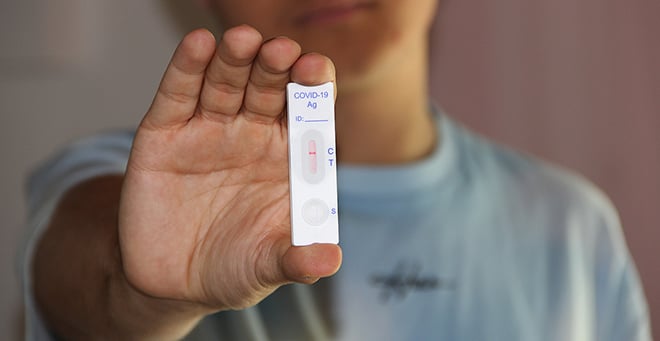Pandemic Reinforces the Role of POC Science in Healthcare

Does the COVID-19 pandemic have a silver lining? A current article by UMass Chan Medical College and UMass Lowell researchers in Humanities & Social Sciences Communications, a Nature Portfolio journal, experiences that curiosity amongst well being care professionals in point-of-care applied sciences (POCTs) elevated through the pandemic, with perceived functions of easy-to-use at-home, cellular or bedside units in a broader vary of ailments.
Well being care professionals additionally considered the adoption of POCTs as facilitating the humanization of epidemiology—in different phrases, sharing management of illness prognosis and administration with sufferers, moderately than persevering with to be provider-driven.
So-called “grey swan occasions,” that are anticipated however unpredictable, can shift attitudes and behaviors, akin to about how societies administer and supply entry to well being care in addition to provide distinctive alternatives to stimulate innovation, the authors wrote. COVID-19 introduced one such grey swan alternative.
“I used to be making an attempt to grasp if there was any kind of constructive trajectory that occurred because of COVID,” stated senior writer Denise R. Dunlap, PhD, affiliate professor of worldwide technique, entrepreneurship and innovation at UMass Lowell’s Manning College of Enterprise. “Fortunately, we had collected knowledge earlier than COVID hit. And subsequently, we had one other survey that was going out throughout that point interval within the pandemic. So, it supplied a novel alternative to check developments pre-and post-COVID.”
Comparatively few different research have checked out elements affecting adoption of POCTs amongst well being care professionals, in keeping with the paper’s authors. COVID-19 supplied a possibility to focus on the weaknesses in well being care supply methods, together with a dependence on laboratory-based diagnostic applied sciences, and to quickly develop novel applied sciences to deal with affected person wants.
Dr. Dunlap and her colleagues labored with UMass Chan researchers David D. McManus, MD, the Richard M. Haidack Professor in Medication and chair and professor of medication; Nathaniel Hafer, PhD, assistant professor of molecular drugs and lead investigator of the Nationwide Institute of Well being’s (NIH) Fast Acceleration of Diagnostics (RADx) Tech Medical Research Core Logistics Group; Craig M. Lilly, MD, professor of medication, anesthesiology and surgical procedure; and T.H. Chan College of Medication fourth-year pupil Sean Teebagy.
“Level of care was actually a backwater for a very long time,” stated Dr. Hafer. “Now, having the COVID expertise, everyone is aware of what an at-home check is and the advantages of having the ability to check themselves. So, the dialog has modified from, ‘What the heck is that this all about?’ to, ‘How will we apply this now to most cancers or different infectious ailments, and many others.?’”
Within the present research, researchers administered equivalent surveys to a community of well being care professionals, researchers and medical gadget builders. The primary survey was distributed from October 2019 to late March 2020. The second was distributed from late October by way of November 2020.
Respondents had been requested to call as much as 5 circumstances for which a POCT might assist make a prognosis of a illness; title as much as 5 circumstances for which a POCT might assist them monitor or handle a illness; and which traits of POCT are most necessary when incorporating it into their common apply.
Previous to the COVID-19 pandemic, well being care professionals recognized 18 medical situation classes for which POCTs might be used to diagnose a illness. Endocrine issues, together with diabetes mellitus, featured prominently amongst these, adopted by infectious illness, cardiovascular and hematology circumstances.
Following COVID-19’s designation as a pandemic, well being care professionals recognized 20 medical circumstances for which POCTs might be used to diagnose a illness. Infectious illness and cardiovascular-related medical circumstances rose to the middle of this community, adopted by endocrine, respiratory and hematology circumstances.
Perceptions of POCTs to handle or monitor a illness additionally shifted. Earlier than the pandemic, well being care professionals recognized heart problems because the class for which point-of-care know-how was most useful for monitoring or managing. As soon as COVID-19 was designated a pandemic, endocrine ailments had been recognized because the situation for which POCT was most helpful. Nonetheless, metabolic ailments skilled the best enhance in curiosity.
“I imagine there are various completely different causes as to why point-of-care know-how grew to become extra necessary after COVID; as a result of the extra you get used to utilizing a know-how, the extra you see the advantages of getting that know-how,” stated Dunlap.
Dunlap steered that through the pandemic, lots of people with heart problems or most cancers didn’t get recognized as a result of they had been afraid to go to the hospital or their well being care supplier canceled routine screenings.
“COVID has made it so not solely had been point-of-care assessments wanted for COVID testing, however point-of-care applied sciences have been wanted as a result of well being care is changing into extra decentralized,” Dr. McManus stated. “There’s no query from our paper that you possibly can see modifications by way of acceptance of those applied sciences and integration into mainstream well being care. Individuals thought they had been extras, however now that’s a vital ingredient in well being care.”
The undertaking developed out of the UMass Heart for Advancing Level of Care Applied sciences (CAPCaT), a member of the NIH Level-of-Care Know-how Analysis Community, co-directed by McManus and co-author Bryan Buchholz, PhD, chair and professor of biomedical engineering at UMass Lowell. Supported by a $7.9 million grant from the NIH, CAPCaT is a part of the Massachusetts Medical Machine Growth Heart (M2D2), operated by UMass Chan Medical College and UMass Lowell, to assist biotech and medical-device startups bridge the hole between concept and market.

